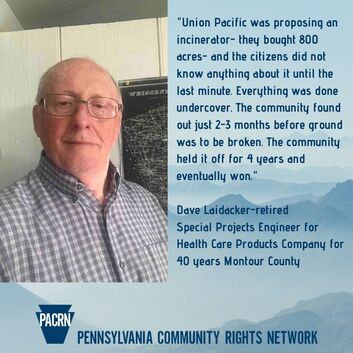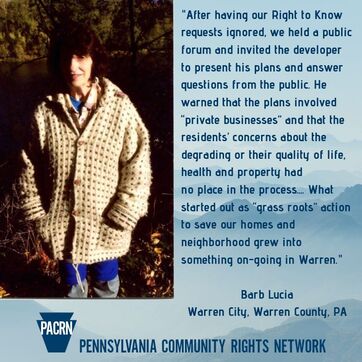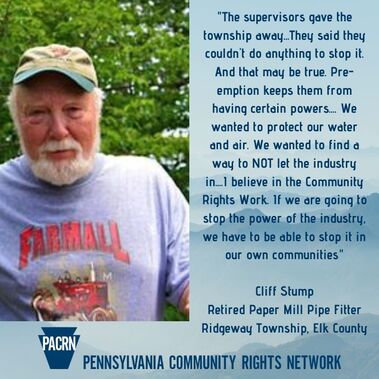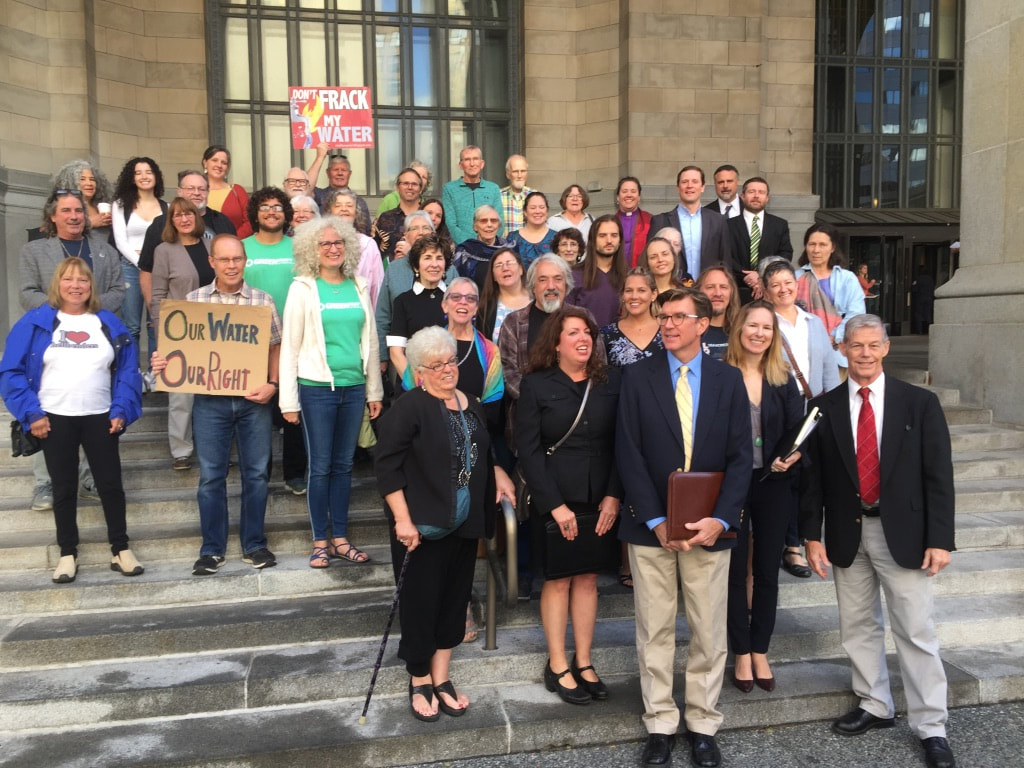|
FOR IMMEDIATE RELEASE
December 15, 2020 CONTACT: Chad Nicholson Community Environmental Legal Defense Fund Pennsylvania Community Organizer [email protected] 207-541-3649 ‘The fossil fuel industry is terrified the tactics taken in Grant Township are spreading.’ Grant Township, Indiana County, PA: Last Wednesday, Pennsylvania General Energy Company (PGE) sued Grant Township in federal court – for a second time – to overturn the community’s law banning frack waste injection wells. The law, drafted with assistance from the Community Environmental Legal Defense Fund (CELDF), includes language recognizing the rights of local ecosystems and was democratically adopted by over 70% of Township voters in 2015. Injection wells threaten drinking water, cause earthquakes, and have been shut down in states such as Ohio and California. The PA Department of Environmental Protection (DEP) also sued Grant Township in 2017, making last week’s filing the third lawsuit to be filed against the Township (pop. 700) for trying to protect its drinking water. Jon Perry, Chairman of the Grant Township Board of Supervisors, said, “So here we go again. PGE throwing another lawsuit at us to try to bring us to heel, when our community has overwhelmingly said ‘hell no’ multiple times. PGE tried but couldn’t sell this well during this time of economic ruin, and so instead has delivered our community a Christmas present that blames our valid local law for its problems and is suing us again.” In March 2020, the DEP cited the law as valid in a decision denying PGE a permit to inject waste. PGE is still appealing that decision, and its filings have revealed that the company has been trying to sell the well. Meanwhile, less than two months ago, in October, a conventional gas well that PGE operates in the Township failed, and has now been shut down and plugged. Dozens of dump containers were filled with contaminated soil and hauled away. At no point did the DEP or PGE notify Grant Township officials of this. That site is less than a mile from the proposed injection well. Chad Nicholson, CELDF organizer in Pennsylvania, said, “The fossil fuel industry is terrified the tactics taken in Grant Township are spreading. This community continues to act as a lighthouse in a raging storm made up of oil and gas corporations, state permitting agencies, and enabling courts that have crashed down on them for over five years. Yet they remain standing, protecting their own community. They serve as both a warning signal to other communities, as well as a beacon of hope and courage to those who wish to fight back. We at CELDF are proud to continue to stand with them in their fight to protect their water and their community.” PGE’s actions come as the fossil fuel industry and sympathetic state legislators continue to ratchet up their opposition to Rights of Nature nationwide. On December 1, 2020, the American Petroleum Institute, perhaps the most influential fossil fuel lobby in the nation, filed a brief in opposition to a federal civil rights case brought by CELDF, in defense of local Ohio communities’ right to vote on qualified Rights of Nature laws. Also on December 1, 2020, a bill (HB 54), to try to ban Rights of Nature in the courts, was introduced in the Missouri House of Representatives, continuing a national trend.
0 Comments
Mar 25, 2020
Pennsylvania Department of Environmental Protection enforces local Grant Township law in revoking permit for dangerous frack waste injection well FOR IMMEDIATE RELEASE March 25, 2020 CONTACT: Chad Nicholson Community Environmental Legal Defense Fund Pennsylvania Community Organizer CELDF.org [email protected] 207-541-3649 GRANT TOWNSHIP, INDIANA COUNTY, PENNSYLVANIA: In an extraordinary reversal, last week, the Pennsylvania Department of Environmental Protection (DEP) revoked a permit for a frack waste injection well in Grant Township. DEP officials cited Grant Township’s Home Rule Charter banning injection wells as grounds for their reversal. Injection wells are toxic sewers for the fracking industry that cause earthquakes, receive radioactive waste, and threaten drinking water and ecosystems. Township residents popularly adopted a Home Rule Charter (local constitution) in 2015 that contains a “Community Bill of Rights.” The Charter bans injection wells as a violation of the rights of those living in the township and recognizes rights of nature. The Community Environmental Legal Defense Fund (CELDF) assisted in drafting the Charter. In 2017, DEP issued a permit to legalize an injection well in Grant, and simultaneously sued the township. The agency claimed that Grant’s Home Rule Charter – which protects the local environment – interfered with the DEP’s authority to administer state oil and gas policy. Yet, in a stunning about-face, DEP enforced Grant’s law and rescinded the injection well permit, last week. “Grant Township’s Home Rule Charter bans the injection of oil and gas waste fluids,” the DEP writes. “Therefore, the operation of the Yanity well as an oil and gas waste fluid injection well would violate that applicable law.” Since 2014, Township residents have faced a variety of intimidation tactics, including lawsuits, from the corporation behind the injection well (Pennsylvania General Energy), the oil and gas industry, and their own state government and agencies. They have not backed down, even in the face of potential municipal bankruptcy. They have continued to assert and protect their community’s rights. “We are over the moon that the permit was rescinded,” said Grant Township Supervisor Vice-Chair Stacy Long. “However, we know the permit should never have been issued in the first place. We can’t forget that DEP sued us for three years, claiming our Charter was invalid. Now they cite that same Charter as a valid reason to deny the industry a permit. It’s hypocritical at best. Add this to the pile of reasons Grant Township did not trust the DEP to protect our environment, and why we’ve had to democratically work at the local level to protect our community.” “This decision does not validate the actions of the DEP, but rather vindicates the resistance that communities like Grant have engaged in to force governmental agencies into doing the right thing,” says CELDF Pennsylvania Organizer Chad Nicholson. “DEP has been acting in bad faith. I’m glad they revoked the permit. But it took them too long to do what all governments should be doing: enforcing democratically-enacted local laws that protect public health and safety.” Grant Township is aware that the industry and/or state agencies, such as DEP, may sue them again. As of today, there is no injection well in Grant Township. Press Release: Grant Township Injection Well Ban Stands, Court Denies ‘Collateral Attack’ from DEP3/6/2020 Grant Township is advancing constitutional law in Pennsylvania while protecting its water and recognizing the rights of nature FOR IMMEDIATE RELEASE March 4, 2020 CONTACT: Chad Nicholson Community Environmental Legal Defense Fund Pennsylvania Community Organizer CELDF.org [email protected] 207-541-3649 GRANT TOWNSHIP, INDIANA COUNTY, PENNSYLVANIA: On Monday, the Pennsylvania Commonwealth Court rebuked a Pennsylvania Department of Environmental Protection (DEP) attempt to dismiss Grant Township’s Home Rule Charter, calling DEP’s motion a “collateral attack,” and finding it was “without merit.” The judge’s decision allows Grant Township to argue that local governing authority is necessary to protect the community’s constitutional rights in the face of harmful state oil and gas policies. Since 2014, residents of Grant Township (pop. 700) have been threatened with a frack wastewater injection well. These wells are a toxic sewer for the fracking industry, known to receive radioactive waste and cause earthquakes. In 2015, Township residents popularly adopted a Home Rule Charter (local constitution) containing a “Community Bill of Rights.” The Community Environmental Legal Defense Fund (CELDF) assisted in drafting the measure, which bans injection wells as a violation of the rights of those living in the township. It also recognizes rights of nature. In 2017, the DEP sued Grant, claiming the local charter interfered with its ability to enforce state oil and gas policy. To reiterate: the Department of Environmental Protection sued Grant Township for trying to protect the environment. “Grant Township realized that the DEP has no ear for hearing that a radioactive frack waste dump is a dangerous and bad project for a rural, poor community like ours,” said Grant Township Supervisor Vice-Chair Stacy Long. “DEP’s job is to permit a certain amount of damage, and then try to mitigate it after the damage occurs. That is unacceptable to the people of this community, and so we said ‘NO.’ And then we got sued by our own DEP. We’re glad our case continues.” “We’re happy to continue to stand with Grant Township in the face of DEP’s bullying,” said Chad Nicholson, CELDF Pennsylvania Community Organizer. “Grant’s creative and staunch resistance to the industry and their own hostile state government has ensured that there is still no injection well in Grant. But the fight needs to continue until all communities, including Grant, are able to protect themselves from harmful corporate activities.” On Sept. 17, 2019, a proposed amendment to the Pennsylvania Constitution was introduced into the Pennsylvania House of Representatives (HB 1813) to secure powers for local governments to ban harmful activities such as injection wells. The full court docket is available to view here.  Dave Laidacker Retired Special Projects Engineer for Health Care Products Company for 40 years Montour County (but from Northumberland County) Community Group Name: Organizations United for the Environment Industrial Threat: Largest hazardous waste incinerator east of the Mississippi being proposed to go in Union County PA Year(s) story takes Place: 1990-1994 Union Pacific was proposing an incinerator- they bought 800 acres- and the citizens did not know anything about it until the last minute. Everything was done undercover. The community found out just 2-3 months before ground was to be broken. The community held it off for 4 years and eventually won. Regularly 1000 people would show up for events/actions. History In the 1940s the government had come in and bought over 3000 acres in Lycoming & Union Counties. People were told they had one month to get out. It was a case of Eminent Domain. There were 209 properties seized. The town was called Elvira. The purpose was to build munitions for the war (WWII). All the houses were torn down and the town was torn down (businesses & homes). Government used the facility to build TNT for 1.5 years. Then shut it down and buried everything, with pipes leading to the river to drain all excess fluids. (There are still bunkers on the property, which is now owned by Allenwood Prison) In the 70s there was a threat of the Lycoming Landfill- and that is when the OUE was developed. That landfill facility- small contingency fought but lost… But for the incinerator- the main reason they won is because they did “uncivil protests.” The org would run officials out of meetings. They would go to the homes of people who worked for Union Pacific- circle their homes for hours- with 30-40 cars. They went to their home towns and distributed pamphlets about the individuals on the UP board- roadblock areas- had signs on every major highway. The UP took legal action against OUE. The workers had to have people follow them around for safety- The people of Elvira were tired of being pushed around. After that was over in ’94- kept the group kept working over years- fought two more incinerators- and won. Fought corporate farms from being built- and they won some and lost some. The OUE was a place people could go to talk about how the government was limiting their rights and their voices. They created a newsletter that went out 3X a year- and that is how they created their money. (8 pages long- with all the stories of updates).  Warren City, Warren County, PA Resisting shale drilling wastewater dumping in our City, our River and our rural roads. 2010 – 2019 I was simply a resident in the West Side neighborhood of the City of Warren, not involved in any political action, until 8 years ago when we learned through a reporter’s “leak” of a “secret” plan to place a Marcellus Shale drilling wastewater plant in our neighborhood, actually on our street! An outside developer had partnered with our city officials secretly to put these plans into place. In September 2010,two next door neighbors delivered flyers to every address in the West Side, asking residents to come to a community meeting to find out about this. 44 neighbors came to that first meeting. We formed the West Side Alliance as an informal group of neighbors, friends and residents in the City to protect our homes and our neighborhood. After having our Right to Know requests ignored, we held a public forum and invited the developer to present his plans and answer questions from the public. He warned that the plans involved “private businesses” and that the residents’ concerns about the degrading or their quality of life, health and property had no place in the process. We investigated these plans, discovering 3-1/2 years of secret planning and business deals with our city government, and a funding stream of taxpayer dollars from the state. We discovered investor groups with secret members. We studied Marcellus Shale waste practices and technologies. We talked to people who did this work “hands on”. We learned that the chemicals used are trade secrets and that the wastewater contains carcinogens and radioactivity which would be brought here to our street and would threaten the health, air, water and quality of life of all Warren residents. We could get no response from any elected representatives. We looked for an organization that could help – we found the Community Environmental Legal Defense Fund. They had helped the City of Pittsburgh and other communities, in many cases getting it on the ballot for the citizens to decide and we liked that idea! We obtained 432 voter’s signatures to put a question on the local Ballot in our Home Rule City. It was a rocky road. City government fought it all the way to Commonwealth Court. The City muscled the County Board of Elections into keeping it off the ballot. Our group, represented by Tom Linzey of CELDF, brought suit against the Board of Elections for acting improperly, who then endorsed the ballot question. The City sued the Board of Elections. We joined as a third party intervenor in County Court, which found in our favor. The City appealed to Commonwealth Court to stop the referendum. That court refused to accept the case, stating that plaintiff action must wait until after the election. The referendum was on the ballot by October 20th for the November 8th election. With very little time and even less money we bought 22 signs and no paid ads. We canvassed voters’ homes and wrote letters to the newspaper. We were opposed by an industry trade group who spent thousands of dollars and put up hundreds of signs. The newspaper supported the developer’s claims on the front page. We won 37% of the vote; not winning the election but winning the battle: no new plant and the developer in the wind along with many thousands of state grant monies. The missing money was taken up by a statewide grand jury based in Pittsburgh less than a year later. But that’s another story. What started out as “grass roots” action to save our homes and neighborhood grew into something on-going in Warren. Two years later we stepped up again to prevent further destruction in our section of the Allegheny River from 7 years of shale drilling wastewater discharged into it by a local “old” oil brine plant. The destruction of the river had been tested and proven by extensive federal and state studies. The EPA designated our part of the river as “impaired”. US Fish & Wildlife described it as a “dead zone”. The Duncan Blvd neighborhood across the river, just downstream from the plant, joined in fighting to clean up and protect our river. By reaching out to groups downriver, we provided the testimony and local “standing” for a federal lawsuit against the plant, based on the destruction of federal protected mussels. Federal district court allowed mediation to require the plant to upgrade their facilities to the tune of 1.8 million dollars. They had a deadline to stop discharging into the river until that was accomplished. The end result was the plant closed in early 2017. The 2.64 miles of the Allegheny River directly downstream from the plant remains a “dead zone” with no life. The Duncan Blvd group submitted a plan to dredge the worst part of the radiated sediment to a grant agency in Pittsburgh. We have not received funding and continue to seek ways to update testing of the sediment and apply for funds to dredge the area. This continues with a “new” local group, the Ad Hoc Environmental Group of Warren, who supported the work to establish a moratorium on spreading of “brine” from oil and shale drilling on local dirt roads. That moratorium is statewide since early 2018.The action is on-going as the PA state legislature continues to craft bills to radically rewrite oil and gas regulations to benefit the industry. In conclusion, I express my heartfelt gratitude to CELDF. This is what it’s like to work with CELDF: every step of the way they inject you with fearlessness, bolster your resolve, offer insights that make things clear, and stand right by you, unflinching, with unconditional support. A partnership like that is incomparably valuable, as it extinguishes fear destroys limits and makes everything possible.  Cliff Stump, retired Paper Mill pipe fitter Ridgeway Township, Elk County PA Resisting Fracking 2008-2012 Let Us make our Own Decisions. In 2008, I saw an article in the paper that a man named Ben Price (works for Community Environmental Legal Defense Fund) was coming to town in DuBois as part of a plan to fight fracking here. It made sense to me. Fracking was destroying us. There are wells everywhere. They drill a well and move on. There ain't no pipelines to take the gas away, so first we had the wave of drillers coming in and bullying leases off of folks. Now we'll have the pipelines taking over. I went down to the meeting with Ben. I wanted to support our community going to home rule, so we could make our own decisions. Our home rule campaign was hard. We got the government study commission passed and set up to recommend home rule. But home rule didn't pass. The people in power lied. There were lies being spread about taxes going up. We didn't have enough time to teach our neighbors the truth about fracking, and how home rule would give them more power to protect themselves. I ran for supervisor. You see, our township had to redo their industrial zoning in order to let fracking in. They hired a consultant, met every month in order to get this changed. The people- me and my neighbors, came to convince them against this. We were concerned about our water. We'd heard stories from other places. We all have well water. Supervisors said they have nothing to do about water, that it is a state issue to protect our water, not something that could be done a the township level. Well, it should be. If we can't protect our water, what good is the local government? We asked about the air. Our supervisors said they have nothing to do about the air- that too is something the state regulates. The supervisors were taken by the industry. The supervisors gave the township away. They were all together in this shit- together with the industry. They said they couldn't do anything to stop it. And that may be true. Pre-emption keeps them from having certain powers. But they could have tried. They could have challenged the right of these outside companies from damaging and threatening our lives. The people in the township disagreed with the supervisor. We wanted to protect our water and air. We wanted to find a way to NOT let the industry in. The supervisors accepted the industry's terms. Accepted that fracking was coming. Believed the lies it would be good for our community. I believe in the Community Rights Work. If we are going to stop the power of the industry, we have to be able to stop it in our own communities. I still work with PACRN because we need to make a change.  Grant Township, PA Grant Township, PA A whiplash of partial victories and partial defeats in the MidAtlantic pipeline landscape remind that partial pathways through existing regulatory structures will never be enough to truly protect communities and the environment from a system of spotty regulation, eminent domain, and corporate rights functioning as designed. In the realm of partial victory, on September 10 the Philadelphia federal Third Circuit Court of appeals overturned a lower court ruling, and the ruling of the Federal Energy Regulatory Commission, to halt eminent domain seizures for the PennEast Pipeline through New Jersey. PennEast Pipeline Co. representatives insist they are “committed to moving ahead with the project.” Nonetheless, local groups resisting the pipeline are thrilled to stall it once again. Similarly, in the ongoing fight against the Mariner East pipeline, residents and advocates alike celebrated the Pennsylvania Department of Environmental Protection’s late August assessment of over $319,000 in fines against Sunoco Pipeline LP for failing to follow clean stream, erosion, and other environmental regulations in its construction sites in ten counties. However, these partial victories, when seen in the context of the broader pipeline landscape, make clear the desperate need for community rights and rights of nature. When local political will is lacking, or when Federal pre-emption is asserted, or when the regulatory apparatus functions as designed, as in the late August Federal Energy Regulatory Commission’s decision that the Constitution Pipeline in New York can move forward, there is little recourse communities can turn to stop these projects. Even in the PennEast Pipeline stall "The appellate court said the pipeline still could proceed with a "workaround," and remanded the case back to the lower court." Battling each individual pipeline in court is a lengthy and expensive process, that can stall, but rarely stop, a project from moving forward. We can appreciate these short-term victories, and it’s understandable that we try to use existing agencies and courts to protect our communities. But without a constitutional amendment to protect community and environmental rights, these battles will almost always be stop-gaps, rather than lasting protection. Furthermore, stalling one pipeline in one town does not help other towns fighting pipelines in other places. At some point, we must stop fighting environmental harms one at a time, and instead pursue lasting change. For lasting change, we need a Constitutional Amendment on Community Rights.  It all started, as most of these things do, with a company’s application for a permit. In May of 2013, Pennsylvania General Energy (PGE) applied for a permit from the Environmental Protection Agency to convert one of its gas extraction wells in Grant Township, Indiana County, PA, into an injection well. The company wanted to dump frack wastewater from its other wells. According to their own estimates, PGE proposes to dump more than 151 million gallons of frack wastewater into Grant Township over a ten year period — wastewater that the company’s own sampling reveals will contain toxic and radioactive materials such as barium, radium, strontium, and toluene. The people of Grant Township rely on private wells for drinking water. They decided to stop the project. Working with their elected officials, they adopted a law recognizing the rights of residents to clean air and clean water, and banned frack wastewater injection wells as a violation of those rights. They understood that the corporation could sue the Township for its adoption of the law. Thus, the Township included provisions elevating residents’ rights above the “rights” routinely claimed by corporations. Predictably, the company sued, claiming that its “rights” had been violated by the Township and that the Town- ship lacked the power to adopt the law in the first place. In its defense of the Township, CELDF lawyers argued that the people of Grant possess a constitutional right of local community self-government, and that the company’s assertion of its “rights” to override Grant Township constituted an unconstitutional violation of that right of self-government. Thus, CELDF lawyers contended that it wasn’t the Township that had violated the corporation’s “rights,” but the other way around. Of course, corporations have long used these types of lawsuits to “chill” communities from interfering with company plans, and from making those arguments in court. Lately, however, that “chilling” effect hasn’t been working. As more and more communities have come into the cross-hairs of corporations proposing pipelines, frack wells, and a variety of other projects, community members are advancing democratic and environmental rights to stop them. And so the corporations have begun to come after the lawyers, believing that if they can scare the lawyers off, they will deprive the communities of legal representation. Three years after the company sued Grant Township, it filed a motion for sanctions against CELDF lawyers Thomas Linzey and Elizabeth Dunne, seeking over half a million dollars from the two of them. The company asserted that CELDF’s arguments in the case — that the community has a constitutional right to govern itself, and a right to stop these types of harmful projects — was frivolous. Corporate attorneys asserted that the arguments were advanced solely to harass the company and drive up its litigation costs. On January 5, 2018, Judge Susan Baxter granted part of PGE’s motion, awarding $52,000 in fees against attorneys Linzey and Dunne. Holding that “settled law opposes [their] arguments” and that the “community rights” doctrine had been “discredited and previously litigated,” she ordered the attorneys to pay part of the company’s original request for sanctions. Judge Baxter’s ruling is unusual. Attorneys are, and have always been, allowed to argue for good faith changes to the law. In fact, that’s part of how major strides were made in prior people’s movements where rights-based legal arguments were advanced to end segregation, gain women’s right to vote, and gain the right to same sex marriage. It is no coincidence that as people reclaim Community Rights and recognize Rights of Nature, corporate and institutional hostility has escalated. That escalation, while challenging, is evidence of the movement’s success in its own right. CELDF views the sanctions as part of a new strategy by companies to punish lawyers for representing communities like Grant. In a statement put out by Grant Township, the Board of Supervisors declared that: “We understand that the system of law that we live under doesn’t recognize the right of the people who live here to stop those projects which will harm us. It doesn’t recognize that we have a democratic right to say “no,” which is why we’ve worked with CELDF to advance arguments that we have a constitutional right to govern our own community, and that companies like PGE shouldn’t have more rights to decide what happens here than we do. It’s Grant Township’s hope that our attorneys will wear this slap as a badge of courage, just as any front line veteran would wear a scar. This is bigger than just Grant Township, and we want others to join this fight by standing up to protect their communities. We’re not going anywhere.” Attorneys Linzey and Dunne have appealed the sanctions to the Third Circuit Court of Appeals. This piece was originally published at https://celdf.org/2018/05/when-good-faith-is-punishable-by-sanctions/. |
AuthorPACRN is a 501c3 nonprofit dedicated to helping Pennsylvania communities establish local self-governance, social justice, Archives
March 2021
Categories
All
|
Telephone207-541-3649
|
Donate |


 RSS Feed
RSS Feed